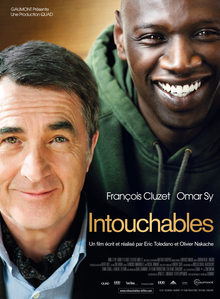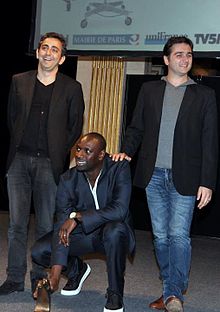The Intouchables
| The Intouchables | |
|---|---|
 | |
| Directed by | Olivier Nakache Éric Toledano |
| Written by | Olivier Nakache Éric Toledano |
| Produced by | Nicolas Duval-Adassovsky Laurent Zeitoun Yann Zenou |
| Starring | François Cluzet Omar Sy |
| Cinematography | Mathieu Vadepied |
| Edited by | Reynald Bertrand |
| Music by | Ludovico Einaudi |
| Distributed by | Gaumont (France) |
Release dates |
|
Running time | 113 minutes |
| Country | Template:Film France |
| Language | French |
| Budget | €9,500,000 |
| Box office | €274.5 million $343.6 million[1] |
The Intouchables (French: Intouchables, which translates literally as Untouchable) is a French film directed by Olivier Nakache and Éric Toledano. In just nine weeks after its release in France on 2 November 2011 it became the second most successful French film of all time (in number of viewers) in the French box office, behind the 2008 film Welcome to the Sticks.[2]
The feel-good dramatic comedy has become a cultural phenomenon in France where it was voted the cultural event of 2011 with 52% votes.[3]
Plot
The movie tells the development of the improbable friendship between Philippe, a wealthy tetraplegic, and Driss, a young offender of Senegalese descent, who is hired as his live-in carer.
The film begins at night in Paris. Driss is driving Philippe's Maserati Quattroporte at full speed, with Philippe in the front passenger's seat. They are soon chased by the police. "I bet you 100 euros I shake them off," Driss tells his passenger. Yet they are caught. Unfazed, Driss doubles his bet with Philippe, convinced they will get an escort. In order to get away with his speeding, Driss claims the tetraplegic Philippe must be urgently driven to the emergency room; Philippe pretends to have a stroke and the fooled police eventually escort them to the hospital. The two men are jubilant. As the police leave them at the hospital Driss says "Now let me take care of it," and they drive off.
The story of the two men is then told as a flashback, which occupies most of the film.
Philippe, a rich quadriplegic who owns a luxurious Parisian mansion, is interviewing, along with his assistant Magalie, to recruit a live-in carer to help him. Driss, a candidate, has no ambitions to get hired. He is just there to get a signature showing he was interviewed and rejected in order to continue to receive his welfare benefits. He is extremely casual and shamelessly flirts with Magalie. He is told to come back the next morning to get his signed letter. Driss goes back to the tiny flat that he shares with his extended family in a bleak Parisian suburb. His aunt, exasperated from not hearing from him for six months, orders him to leave the flat.
The next day, Driss returns to Philippe's mansion and learns to his surprise he is on a trial period for the live-in carer job. He learns the extent of Philippe's disability and then accompanies Philip in every moment of his life, discovering with astonishment a completely different lifestyle. A friend of Philippe's reveals to Philippe Driss' criminal record which includes six months in jail for robbery. Philippe states he does not care about Driss' past as long as he does his current job properly.
Over time, Driss and Philippe become closer. Driss dutifully takes care of his boss, who frequently suffers from psychosomatic pain. Philippe discloses to Driss he became disabled following a paragliding accident and that his wife died without bearing children.
Gradually, Philippe is led by Driss to put some order in his private life, including being more strict with his adopted daughter Elisa, who behaves like a spoiled child with the staff. Driss discovers modern art and opera and suddenly decides to paint.
For Philippe's birthday, a private concert of classical music is performed in his living room. At first very reluctant, Driss is led by Philippe to listen more carefully to the music and opens up to Philippe's music. Driss then plays the music he likes to Philippe (Earth, Wind & Fire).
Driss discovers that Philippe has a purely epistolary relationship with a woman called Eleonore, who lives in Dunkirk. Driss encourages him to meet her but Philippe fears her reaction when she discovers his disability. Driss eventually convinces Philippe to talk to Eleonore on the phone. Philippe agrees with Driss to send a photo of him in a wheelchair to her, but he hesitates and asks his aide, Yvonne, to send a picture of him as he was before his accident. A date between Eleonore and Philippe is agreed. At the last minute Philippe is too scared to meet Eleonore and leaves with his aide Yvonne before she arrives. Philippe then calls Driss and invites him to travel with him in his private jet for a paragliding week-end. Philippe gives Driss an envelope containing 11 000 euros, the amount he was able to get for Driss's painting, which he shamelessly sold to one of his friends, by saying it was from an up-and-coming artist.
Adama, the younger brother of Driss, who is in trouble with a gang, takes refuge in Philippe's mansion. Driss comes clean about his family and reveals his secret wounds. Philippe eventually advises Driss, who "may not want to push a wheelchair all his life", to seek work elsewhere.
Driss returns to his suburbs, joining his friends, and manages to help his little brother. Due to his new professional experience, he lands a job in a transport company. In the meantime Philippe has hired carers to replace Driss but he isn't happy with any of them. His morale is very low and he stops taking care of himself. Yvonne is worried and contacts Driss. Driss arrives and decides to drive Philippe in the Maserati and the action comes back to the first scene of the film, the police chase. After they have eluded the police, Driss takes Philippe straight to the seaside. Driss and Philippe arrive at a restaurant with a great view of the ocean. Driss suddenly leaves the table and says good luck to him for his meeting. Philippe does not understand but a few seconds later Eleonore arrives. Philippe looks outside and sees Driss walking along the seawalk, smiling at him.
Background
The plot of the film is inspired by a true story discovered by the directors in a 2004 documentary film.[4]
Cast

- François Cluzet as Philippe
- Omar Sy as Driss
- Audrey Fleurot as Magalie
- Clotilde Mollet as Marcelle
- Anne Le Ny as Yvonne
- Alba Gaïa Kraghede Bellugi as Elisa
- Cyril Mendy as Adama
- Christian Ameri as Albert
- Grégoire Oestermann as Antoine
- Marie-Laure Descoureaux as Chantal
- Absa Dialou Toure as Mina
- Salimata Kamate as Fatou
Reception
The film won the Tokyo Sakura Grand Prix award given to the best film at the Tokyo International Film Festival and the Award for Best Actor to both Francois Cluzet and Omar Sy [5] in 2011.
Omar Sy received the César Award for Best Actor on 24 February 2012 for the role of Driss (defeating Jean Dujardin, nominated for The Artist). He is the first actor of African descent to receive this award.
In the United States, a review published in Variety finds the movie "offensive", "which flings about the kind of Uncle Tom racism one hopes has permanently exited American screens".[6] In the film Driss (Omar Sy) is of Senegalese descent. Most French journalists do not understand such an interpretation and highlight the cultural issue that America has with anything linked to ethnicity.[7]
The film currently holds a 80% Fresh rating at the film review aggregate site Rotten Tomatoes, which includes 47 positive and 12 negative reviews out of 59 reviews.[8]
The Weinstein Company has acquired rights of the film in English-speaking countries, Scandinavian countries, China and US remake rights.[9]
Box office
As of 25 November 2011, after four weeks, "The Intouchables" had already become the most-watched film in France in 2011[10] After sixteen weeks more than 19 million people saw this film in France, The Intouchables was the second most-seen French movie of all-time in France, and the third including foreign movies. On 10 January 2012, "The Intouchables" set a record, having been number one for ten consecutive weeks since its release in the French box office.
As of 20 May 2012, the film has done well in several other European countries, topping charts in Germany for nine consecutive weeks, Switzerland for eleven weeks (S.German 11, S.French 8, S.Italian 6), Austria for six weeks, Poland for three weeks, and Italy Spain & Belgium for one week.[11]
On 20 March 2012 The Intouchables became the highest-grossing movie in another language than English with $281 million. It broke the previous record set by the Japanese film Spirited Away ($274.9 million).[12]
Accusation of plagiarism
The film Beautiful was accused of plagiarising the plot of The Intouchables. Later, the accusation was removed as Beautiful had already been in post production state with a trailer released by the time The Intouchables was released.[citation needed]
Soundtrack
- Ludovico Einaudi – "Fly" (3:20)
- Earth, Wind & Fire – "September" (3:33)
- Omar Sy, François Cluzet & Audrey Fleurot – "Des références..." (1:08)
- Ludovico Einaudi – "Writing Poems" (4:09)
- George Benson – "The Ghetto" (4:57)
- Omar Sy & François Cluzet – "L'arbre qui chante" (1:01)
- Terry Callier – "You're Goin' Miss Your Candyman" (7:18)
- François Cluzet & Omar Sy – "Blind Test" (2:21)
- Earth, Wind & Fire with The Emotions – "Boogie Wonderland" (4:45)
- Ludovico Einaudi – "L'origine nascosta" (3:12)
- Nina Simone – "Feeling Good" (2:53)
- Ludovico Einaudi – "Cache-cache" (3:51)
- Angelicum De Milan – "Vivaldi: Concerto pour 2 violons & Orchestra" (3:21)
- Ludovico Einaudi – "Una mattina" (6:41)
- Vib Gyor – "Red Light" (4:29)
References
- ^ "box office Intouchables". box office mojo. Retrieved 28 April 2012.
- ^ Intouchables réussira-t-il à battre les Ch'tis ? 9/1/2012, )
- ^ Le succès du film "Intouchables", événement culturel de l'année 23/12/2011, AFP
- ^ Intouchables > Secrets de tournage: Inspiré de faits réels, allocine.
- ^ Award winners at the Tokyo International Film Festival in 2011
- ^ Untouchable Jay Weissberg, Variety, 29, 2011, 8:57pm
- ^ "Intouchables" n'est pas plus raciste que le "Flic de Beverly Hills"... 11/12/2011
- ^ The Intouchables at Rotten Tomatoes
- ^ Weinstein Co. to remake French film 'Untouchable' Joshua L. Weinstein, Reuters, Jul 8, 2011 6:04pm
- ^ Template:FrArticle RTL : "Intouchables" devient le film le plus vu de l'année !
- ^ "Intouchables passe la barre des 340 millions $ et cumule 39.339.231 spectateurs au 20 mai 2012". Box-office Intouchables. Retrieved 26 May 2012.
- ^ Template:Fr"Intouchables : plus gros succès de l'histoire pour un film non-anglophone". Ozap. 21 March 2012. Retrieved 21 March 2012.
